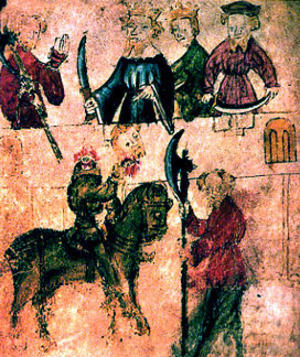
I was preparing an extract from the 14th-century chivalric romance Sir Gawain and the Green Knight for a class the other day when I suddenly realised that it's basically a description of a rather aimless D&D hexcrawl. Gawain is on a quest for the Green Chapel, but he doesn't know where it is except that it's 'somewhere in the wilderness of Wirral'; so all he can do is blunder about from hex to hex, fighting monsters and having random encounters, until finally he's reduced to praying for outright divine intervention. He even sleeps in his armour like a proper D&D character!
Here's the text. Original Middle English on the left. My (painfully literal) translation on the right.
|
Middle
English Text
|
Literal
Modern Translation
|
|
He made non abode,
|
He
made no stop,
|
|
Now ridez þis renk þurȝ þe ryalme of Logres,
|
Now
rides this hero through the realm of Logres,
|
|
Alle þe iles of Anglesay on lyft half he haldez,
|
All
the isles of
Over
at Holy Head, until he had landed
In
the wilderness of Wirral; there very few lived
That
loved either God or man with good heart.
If
they had heard any talk of a green knight
And
all replied that, no, never in their lives
|
|
Þe knyȝt tok gates straunge
|
The
knight took strange roads
|
|
Mony klyf he ouerclambe in contrayez straunge,
|
Many
cliffs he climbed over in strange countries,
Far
asunder from his friends, lonely he rode.
At
each ford or water where the hero passed
It
was strange if he found not a foe before him,
And
that so foul and fell that he was forced to fight.
Sometimes
with wild men, that lived in the cliffs,
Both
with bulls and bears, and at other times with boars,
|
|
Nade he ben duȝty and dryȝe, and Dryȝtyn had
serued,
|
Had
he not been doughty and stern, and served God,
And
froze before it could fall to the earth.
Thus
in peril and pain and plights full hard
|
|
Þe knyȝt wel þat tyde
|
The
knight well that tide
|
(Spoiler: She does! And that's when the real adventure begins...)
That is a pretty cool observation, I will have to pick up a copy and look at again in a hexcrawl frame of reference. If I ever get around to trying to develop it into a hex or branching path adventure, I will let you know how it goes. Awesome blog!
ReplyDeleteWell, this is the only hexcrawly bit: the rest is basically a long social encounter in which the GM tries to mess with poor Gawain's head. But just reading it is enough to pretty much work out what the random encounter table for the Wilderness of Wirral looks like. 1-2: 1d3 giants. 3-5: 2d6 wolves. 6-7: A raiding party of 3d6 cliff-dwelling barbarians. And so on...
DeleteHuh, its weird, I grew up on the Wirral and I was reading Simon Armitages translation a few days ago.
ReplyDeleteI forgot how borderline bisexual that poem is. Damn thing nearly became a porno.
I guess that makes you one of the wodwos þat woned in þe knarrez, then!
DeleteAs you probably know, men kissing each other wasn't such a big deal in the 14th century; but, even so, I agree that the poem seems rather interested in gender fluidity. There's no reason to think its author was necessarily male, is there? The MS is anonymous, and we know that other medieval Arthurian romances were written by women...